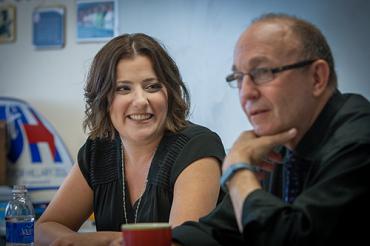Thousands of college students struggle to meet their bills, and many have to drop out of school before reaching graduation. Now many of them will have more resources to keep them in class, thanks to an expanding emergency fund organized by faculty union members.
The FAST Fund started at Milwaukee Area Technical College, where Local 212 has already helped nearly 100 students by providing small amounts of money to students in need. Those infusions of cash can make all the difference, sometimes saving students from eviction and other times ensuring they have enough food to eat.
The fund—called FAST for Faculty and Students Together—is donation-based and has raised $45,000 in the two years since it was launched. Now a matching donation from Sara Goldrick-Rab, a researcher who initiated the project when she was a faculty member at the University of Wisconsin, is allowing the fund to expand to other schools. The gift comes in the form of a challenge grant, taken from the $100,000 Grawemeyer Award Goldrick-Rab won last fall. (She is pictured at right with Michael Rosen, the former Local 212 president who pioneered the fund at Milwaukee Area Technical College.)
With $10,000 of that grant money, the Temple Association of University Professionals has launched a new FAST Fund at Temple University in Philadelphia, where Goldrick-Rab now teaches. The fund will have particular impact because Philadelphia has a high rate of poverty and high housing costs. Students frequently struggle to stay in school, and the fund, which launched in February, has already saved one student from eviction. It's also collected $600 in donations thus far, primarily from faculty. The union was happy to step up, says Norma Corrales-Martin, who as TAUP treasurer manages the fund. "The faculty, the university and other students need to support students in need."
In Milwaukee, the two-year-old fund has already prevented 23 evictions, provided four homeless students with housing, and paid a rental application fee for another. It's covered 13 auto repair bills, one towing fee and two car notes to avoid repossession. In three cases, it has provided students with food; in two, it's paid healthcare license fees so that students could find jobs and in another covered replacement costs for textbooks and a laptop.
Diane Thomas is one grateful beneficiary (shown with Local 212 President Lisa Conley and Executive Vice President Kevin Mulvenna). Before she enrolled at MATC, she worked two jobs and saved as much as she could so she could pay for a program that would earn her a degree in nursing—her dream job. When she left one job to attend classes, she had just enough money for tuition, rent, food, gas and books—but she nearly dropped out because she couldn't afford the iPad required for the RN associate program. The FAST fund stepped in to pay for the iPad, and she stayed in school.
"I am continuing on with my program and working hard to finish out my semester strong," she wrote Michael Rosen, a retired MATC professor and former Local 212 president who is managing the fund. "My goal is to graduate with high honors in December 2019, and I hope one day I can return the favor back to the FAST Fund to help out another student in need."
Another student, a single mother of four boys, ran into trouble when her car broke down. Stephanie Herbst told Rosen she had to choose between a $500 repair and $500 rent. She chose the repair so she could get to work, attend classes and drive her children to school, but she had nothing left for rent. "FAST Fund helped me when I was in a time of need and was on the verge on losing my house," she wrote. "I am forever grateful."
The college financial aid system does not work for many students, says Goldrick-Rab, whose book Paying the Price: College Costs, Financial Aid and the Betrayal of the American Dream examines not only the expense of college but also the poverty many students experience. Too many are forced to drop out before receiving a degree, "saddling them with mountains of debt but nothing to show for it," she writes. "Increasingly common challenges such as homelessness and hunger are never addressed through traditional financial aid routes."
FAST Fund eliminates red tape and gets right to the heart of the need. Goldrick-Rab's research has found that "often it's a smaller amount of money given at the right time that makes the difference between a student staying in college or dropping out," she says. "This money can help make students' immediate survival possible, while we also work to create the systemic change to solve the root causes of this problem."
[Virginia Myers]


